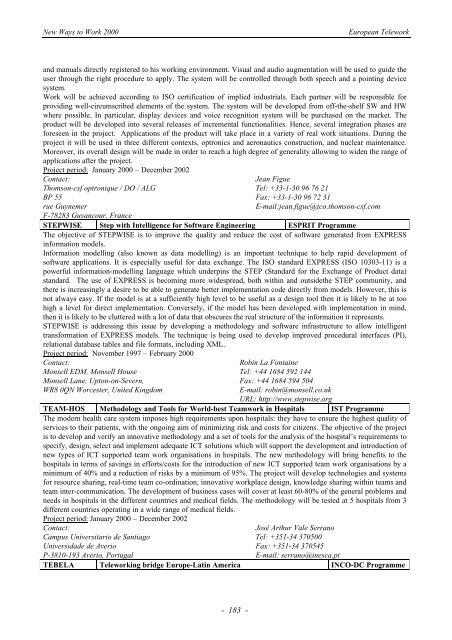eWORK 2000 - European Telework Week
eWORK 2000 - European Telework Week
eWORK 2000 - European Telework Week
- No tags were found...
Create successful ePaper yourself
Turn your PDF publications into a flip-book with our unique Google optimized e-Paper software.
New Ways to Work <strong>2000</strong><strong>European</strong> <strong>Telework</strong>and manuals directly registered to his working environment. Visual and audio augmentation will be used to guide theuser through the right procedure to apply. The system will be controlled through both speech and a pointing devicesystem.Work will be achieved according to ISO certification of implied industrials. Each partner will be responsible forproviding well-circumscribed elements of the system. The system will be developed from off-the-shelf SW and HWwhere possible. In particular, display devices and voice recognition system will be purchased on the market. Theproduct will be developed into several releases of incremental functionalities. Hence, several integration phases areforeseen in the project. Applications of the product will take place in a variety of real work situations. During theproject it will be used in three different contexts, optronics and aeronautics construction, and nuclear maintenance.Moreover, its overall design will be made in order to reach a high degree of generality allowing to widen the range ofapplications after the project.Project period: January <strong>2000</strong> – December 2002Contact:Thomson-csf optronique / DO / ALGBP 55rue GuynemerF-78283 Guyancour, FranceJean FigueTel: +33-1-30 96 76 21Fax: +33-1-30 96 72 31E-mail:jean.figue@tco.thomson-csf.comSTEPWISE Step with Intelligence for Software Engineering ESPRIT ProgrammeThe objective of STEPWISE is to improve the quality and reduce the cost of software generated from EXPRESSinformation models.Information modelling (also known as data modelling) is an important technique to help rapid development ofsoftware applications. It is especially useful for data exchange. The ISO standard EXPRESS (ISO 10303-11) is apowerful information-modelling language which underpins the STEP (Standard for the Exchange of Product data)standard. The use of EXPRESS is becoming more widespread, both within and outsidethe STEP community, andthere is increasingly a desire to be able to generate better implementation code directly from models. However, this isnot always easy. If the model is at a sufficiently high level to be useful as a design tool then it is likely to be at toohigh a level for direct implementation. Conversely, if the model has been developed with implementation in mind,then it is likely to be cluttered with a lot of data that obscures the real structure of the information it represents.STEPWISE is addressing this issue by developing a methodology and software infrastructure to allow intelligenttransformation of EXPRESS models. The technique is being used to develop improved procedural interfaces (PI),relational database tables and file formats, including XML.Project period: November 1997 – February <strong>2000</strong>Contact:Monsell EDM, Monsell HouseMonsell Lane, Upton-on-Severn,WR8 0QN Worcester, United KingdomRobin La FontaineTel: +44 1684 592 144Fax: +44 1684 594 504E-mail: robin@monsell.co.ukURL: http://www.stepwise.orgTEAM-HOS Methodology and Tools for World-best Teamwork in Hospitals IST ProgrammeThe modern health care system imposes high requirements upon hospitals: they have to ensure the highest quality ofservices to their patients, with the ongoing aim of minimizing risk and costs for citizens. The objective of the projectis to develop and verify an innovative methodology and a set of tools for the analysis of the hospital’s requirements tospecify, design, select and implement adequate ICT solutions which will support the development and introduction ofnew types of ICT supported team work organisations in hospitals. The new methodology will bring benefits to thehospitals in terms of savings in efforts/costs for the introduction of new ICT supported team work organisations by aminimum of 40% and a reduction of risks by a minimum of 95%. The project will develop technologies and systemsfor resource sharing, real-time team co-ordination, innovative workplace design, knowledge sharing within teams andteam inter-communication. The development of business cases will cover at least 60-80% of the general problems andneeds in hospitals in the different countries and medical fields. The methodology will be tested at 5 hospitals from 3different countries operating in a wide range of medical fields.Project period: January <strong>2000</strong> – December 2002Contact:Campus Universitario de SantiagoUniversidade de AverioP-3810-193 Averio, PortugalJosé Arthur Vale SerranoTel: +351-34 370500Fax: +351-34 370545E-mail: serrano@inesca.ptTEBELA <strong>Telework</strong>ing bridge Europe-Latin America INCO-DC Programme- 183 -








